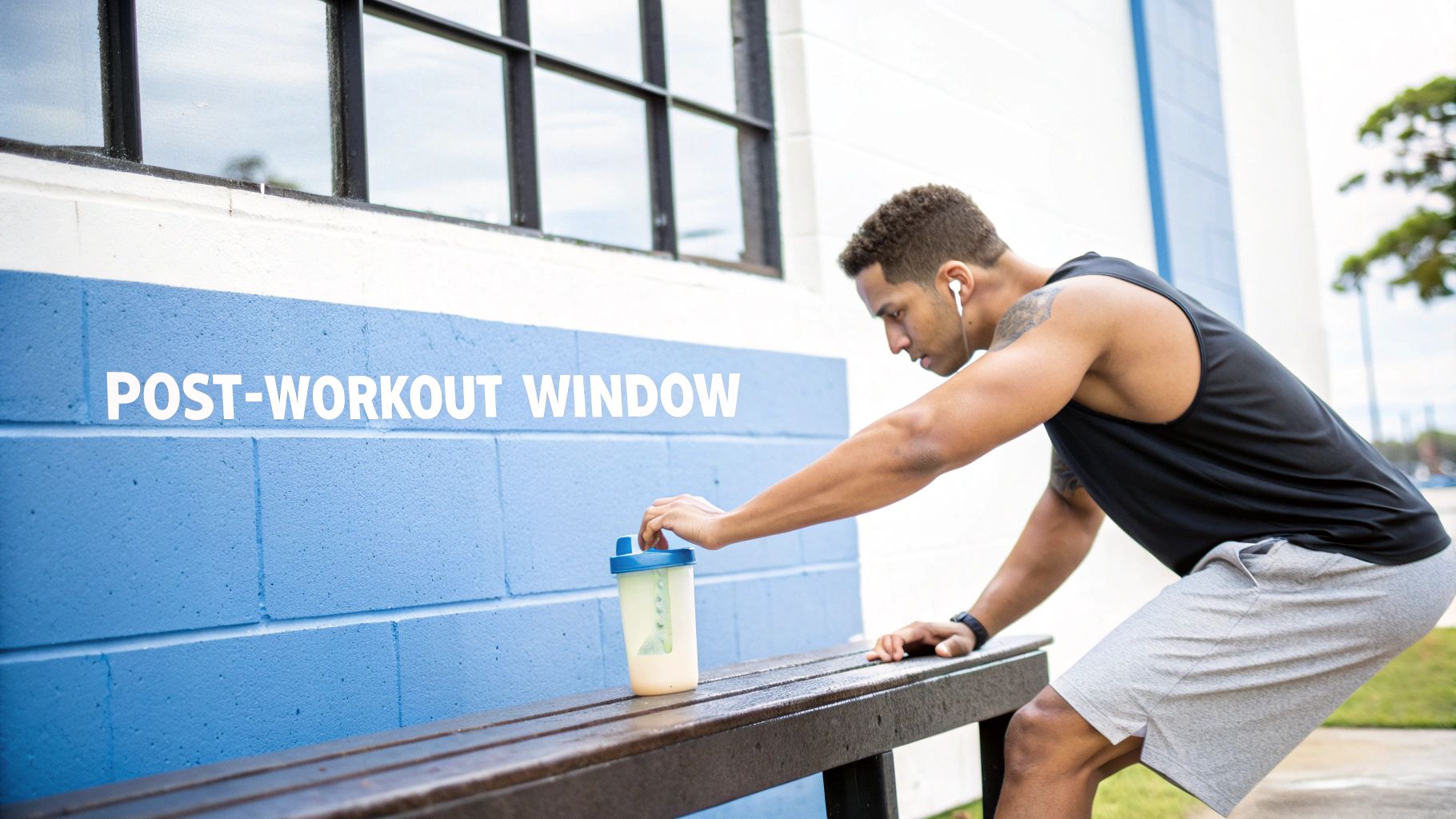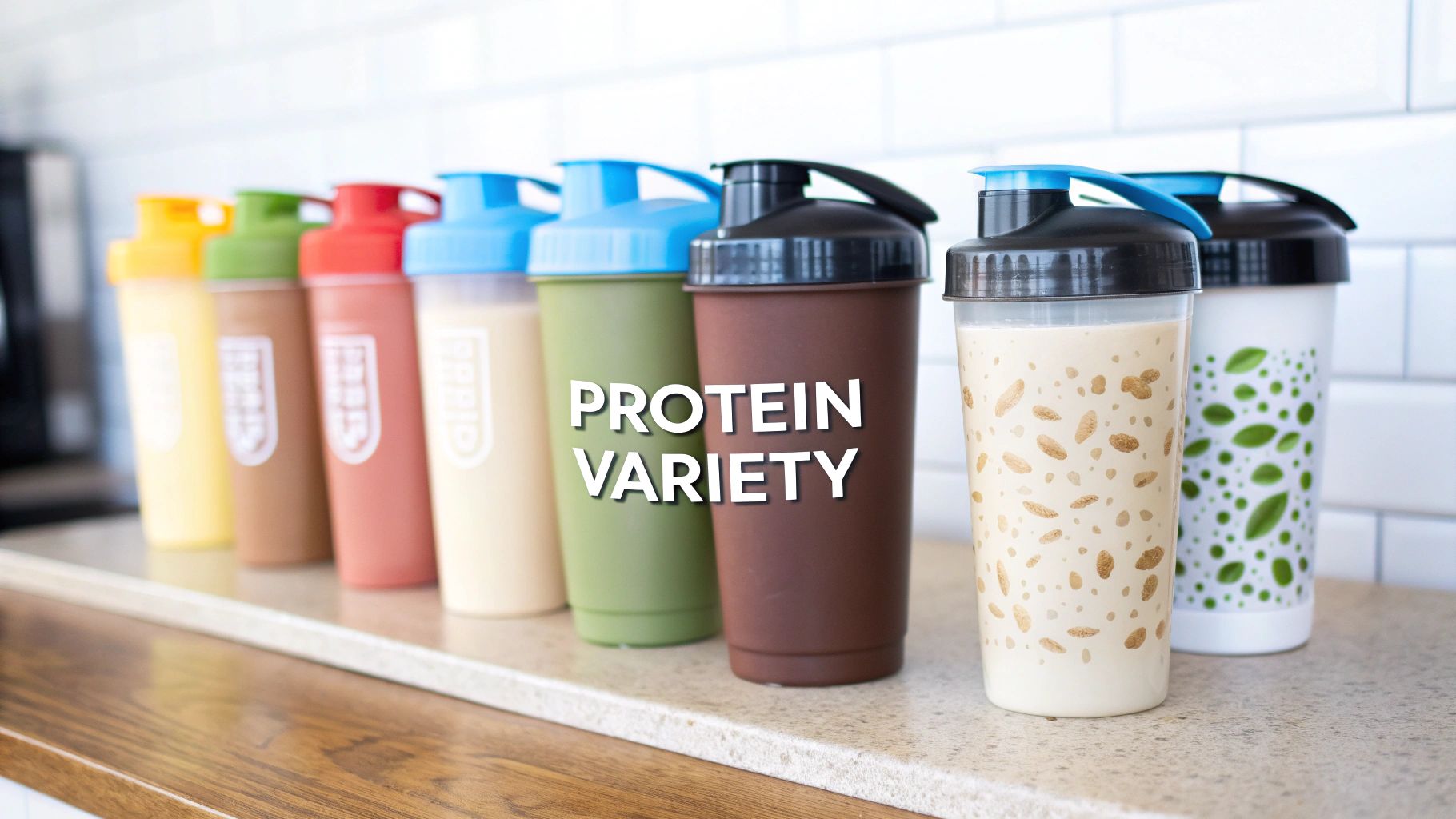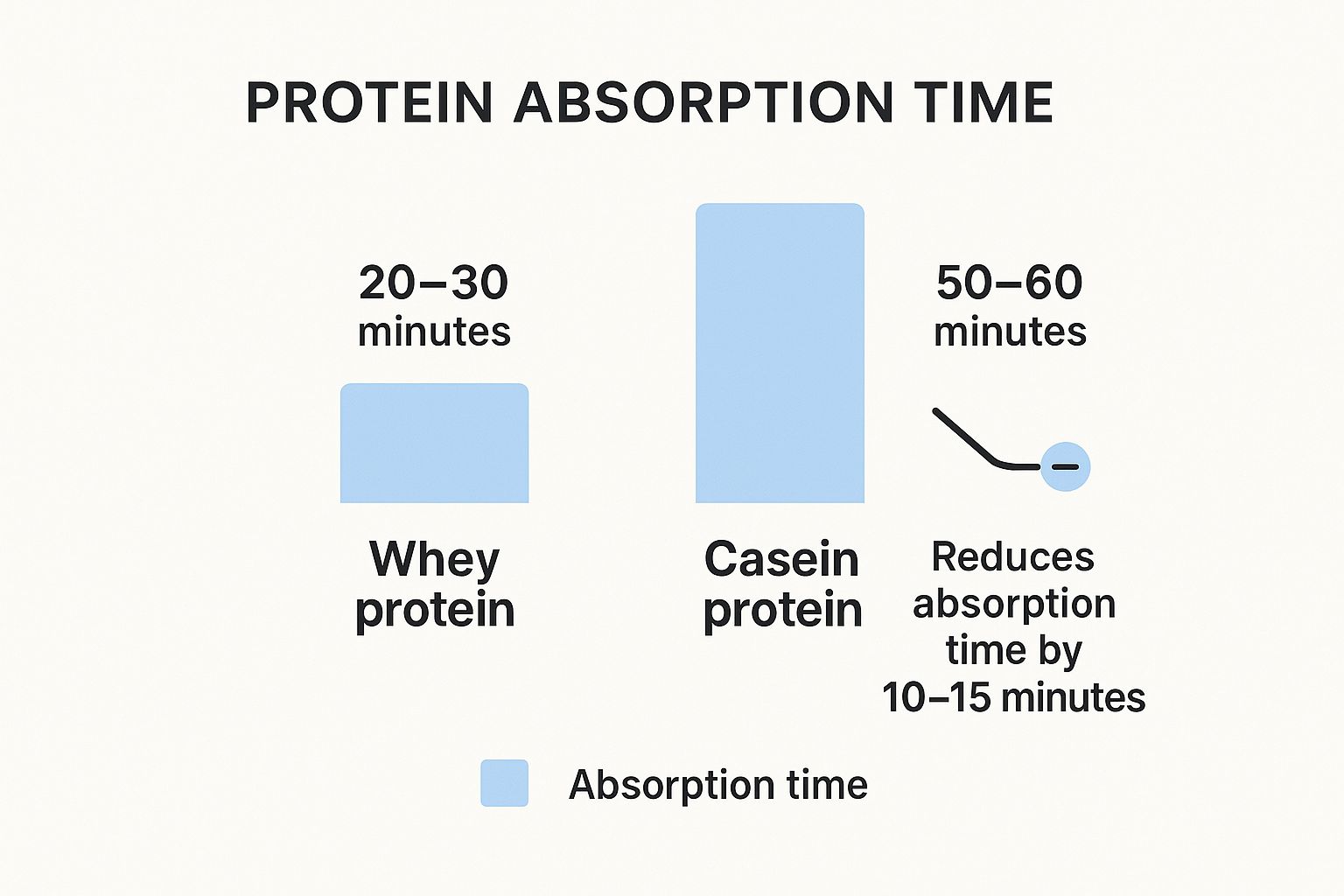The Truth About Post-Workout Protein Timing
Imagine finishing a tough workout, sweat pouring off you, and suddenly you're scrambling for your protein shake. For years, the fitness world has emphasized the importance of the 30-minute "anabolic window," urging us to gulp down protein immediately after training to maximize muscle growth. But recent research suggests a different story – your muscles are much more flexible than we once thought.
The old idea of the anabolic window implied that consuming protein within 30-60 minutes of exercise was crucial for muscle growth and recovery. However, newer studies show this window is likely much longer. Research indicates muscle sensitivity to protein can last up to 24 hours post-workout, making the precise timing of protein intake less critical. Learn more about the anabolic window.
Think of your post-workout recovery like catching a train. There are ideal times to board, but missing one train doesn’t mean you’ll never reach your destination. This is much like when to drink your post-workout protein shake. While there's a period of increased muscle receptiveness to nutrients, it's not a frantic 30-minute dash. It's more like an extended boarding call.
This new understanding takes the pressure off needing to immediately chug a protein shake, allowing for a more relaxed approach. It means you can prioritize whole food protein sources. Instead of reaching for a shake right away, you can plan a balanced, protein-rich meal within a few hours of your workout. Interested in adding hemp protein to your routine? Check out this article: Hemp Protein: The Perfect Post-Workout Shake. This broader perspective on protein timing allows for a more sustainable and less stressful approach to nutrition, which is key for long-term success.
How Your Muscles Actually Process Post-Workout Protein

Think of your muscles after a tough workout like a city under construction. Exercise creates tiny tears in your muscle fibers – it's like demolition crews clearing out old buildings to make way for new ones. This is where protein comes into play. Protein acts as the construction crew and supplies, delivering the raw materials needed for repair and growth.
When you eat protein, your body breaks it down into amino acids, the individual bricks used to rebuild and reinforce those damaged muscle fibers. These amino acids are transported through your bloodstream, arriving at the "construction sites" in your muscles and kickstarting a process called muscle protein synthesis.
This rebuilding process isn't like flipping a switch; it's more like a steady stream of construction workers arriving at the site over several hours. Your muscles remain primed to accept these amino acids for a surprisingly long period, not just a short burst immediately after your workout. Factors like your training history, age, and even how well you sleep influence how efficiently your muscles take up and use those amino acids.
This doesn't mean timing is irrelevant when considering when to drink your post-workout protein shake. Research on protein timing presents a nuanced picture. For example, a meta-analysis found a small edge in muscle growth when protein was consumed within an hour post-workout. However, this was primarily because the timed groups generally consumed more protein overall, not just because of the timing itself. Discover more insights on protein timing. For some post-workout meal inspiration, check out these 7 Post-Workout Meal Ideas to Fuel Your Recovery. The key takeaway? Total daily protein intake is crucial, but strategic timing plays a supporting role in optimizing muscle recovery and growth.
Why Your Lifestyle Matters More Than Perfect Timing

We all know that understanding the science behind muscle protein synthesis is important for building muscle. But let's be honest, applying that knowledge to our busy lives is where the real challenge lies. Slaving away to a rigid post-workout protein shake schedule might work for some dedicated folks, but it’s not the magic bullet for everyone. In fact, modern research is starting to emphasize flexibility and sustainable practices.
Think of it like budgeting your money. A perfectly crafted budget on paper is fantastic, but if it doesn’t account for that unexpected car repair or a spontaneous weekend trip, it's going to fall apart pretty quickly. Planning your post-workout protein shake is similar. Forcing down a shake at an inconvenient time just isn’t realistic and can lead to inconsistent habits, which ultimately slows down your progress.
The whole debate surrounding the “anabolic window” is a perfect example. This concept proposes that there's a limited time after exercise to maximize muscle growth. However, recent research suggests this window might be much more flexible than we initially thought. One study comparing pre- and post-workout protein consumption found no significant difference in muscle growth between the two. This suggests that personal preference and convenience might play a bigger role than we once believed. Want to dig deeper into the nuances of protein timing? Check out this article: Protein Shake Before or After Workout?. It really highlights the importance of finding what works for you, not chasing some idealized schedule.
At the end of the day, consistency trumps everything. Instead of stressing over perfect timing, focus on consistently hitting your daily protein target. Sure, a well-timed shake can be beneficial, but it’s far less impactful than maintaining a steady protein intake throughout the entire day. This ensures your muscles have a constant supply of the building blocks they need for recovery and growth, regardless of minor timing variations.
Tailoring Protein Timing To Your Specific Goals
Not all workouts are created equal, and neither should your protein intake. Think of it like tailoring a suit: a one-size-fits-all approach just won't cut it. A bodybuilder aiming for massive gains has different needs than a marathon runner, and both differ from someone simply trying to recover from an injury. Understanding how your fitness goals influence when you consume protein is key.

This infographic illustrates the absorption times of whey protein (20-30 minutes) and casein protein (50-60 minutes). It also shows how adding carbohydrates can speed up absorption by 10-15 minutes. Notice how quickly whey protein is absorbed, making it a great choice right after a strength training session. Casein, on the other hand, absorbs more slowly and can be beneficial before bed, providing a steady stream of amino acids throughout the night. Adding carbs to your protein shake can further optimize absorption, particularly after tough workouts.
Strength Training vs. Cardio
When it comes to strength training, consuming 20-30 grams of protein within 1-2 hours post-workout is ideal for muscle repair and growth. Think of it as providing your muscles with the building blocks they need to rebuild and get stronger. With cardio, however, replenishing carbohydrates often takes priority, especially for endurance training. A protein shake isn't as crucial immediately after a long run as it is after hitting the weights.
Morning vs. Evening Workouts
The time of day you train also matters. If you work out in the morning, your body is in a fasted state, making it primed to absorb nutrients. A post-workout dose of protein becomes more critical in this scenario. Conversely, if you train in the evening, your protein intake throughout the day has already contributed to recovery. For example, someone who enjoys a protein-rich dinner after an evening workout might not need an extra shake.
High-Intensity vs. Moderate Exercise
Finally, the intensity of your workout influences protein timing. After a high-intensity session, your muscles crave nutrients for repair, so aim to consume protein within that 1-2 hour window. Moderate exercise, however, puts less stress on the body, offering more flexibility with protein timing. You have a wider window to consume protein after a lighter workout.
To summarize these different scenarios, let's look at a table outlining protein timing strategies.
Protein Timing Strategies by Workout Type and Goals Comparison of optimal protein timing recommendations based on different exercise types and fitness objectives
| Workout Type | Primary Goal | Optimal Timing Window | Recommended Amount | Key Benefits |
|---|---|---|---|---|
| Strength Training | Muscle Growth & Repair | 1-2 hours post-workout | 20-30 grams | Maximize muscle protein synthesis |
| Cardio | Endurance & Recovery | Within a few hours, prioritizing carbohydrates | Amount varies based on individual needs | Replenish glycogen stores |
| Morning Workout | Muscle Recovery & Nutrient Absorption | Shortly after workout | Amount varies based on individual needs | Take advantage of fasted state |
| Evening Workout | Muscle Recovery & Maintenance | Less critical, consider overall daily intake | Amount varies based on individual needs | Daytime nutrition supports recovery |
| High-Intensity | Muscle Repair & Reduce Muscle Breakdown | 1-2 hours post-workout | Amount varies based on individual needs | Provide nutrients for faster recovery |
| Moderate-Intensity | Muscle Maintenance & General Health | More flexible timing | Amount varies based on individual needs | Less stress on muscles, wider window for intake |
As you can see, the optimal protein timing varies significantly depending on your training style and goals. Use this table as a guide to refine your approach and maximize your results.
Making Protein Timing Work In Your Real Life
We've talked about the ideal timing for that post-workout protein shake, but let's be honest: life doesn't always cooperate. Think of this section as your practical guide to protein timing in the real world.
Planning and Preparation Are Key
Just like packing your gym bag preps you for a great workout, prepping your protein shakes sets you up for nutritional success. Make a batch ahead of time and store them in the fridge. Even better, portion out the ingredients into individual containers for grab-and-go convenience. This eliminates the "I don't have time" excuse.
What If You Miss The "Optimal" Window?
First off, don't sweat it! Missing your post-workout shake by an hour or two isn't going to sabotage your gains. The "anabolic window" isn't a tiny window of opportunity; it's more like a relaxed afternoon. Focus on consistently getting your protein in, rather than stressing about hitting that 30-45 minute mark perfectly.
Adapting to Different Lifestyles
Whether you're squeezing in a quick workout during your lunch break or fitting in exercise between errands, adapting your approach is key. Pre-made shakes, protein bars, or planned protein-rich meals can all provide that post-workout nourishment. You might find this resource helpful for tailoring your approach to the fitness industry: Fitness. Also, check out this interesting article: Using Hemp Protein for Weight Loss.
Troubleshooting Common Challenges
Even with the best planning, unexpected schedule changes or travel can throw a curveball. This is where backup options come in handy. Pack individual servings of protein powder, keep non-perishable protein snacks on hand, or consider ready-to-drink shakes. The goal is to be prepared, no matter what life throws your way.
Remember, the best post-workout protein plan is one you can maintain. Focus on building sustainable habits that fit your lifestyle and support your fitness goals in the long run.
Busting Common Protein Timing Myths

Let's talk protein timing. It's a topic that generates a lot of questions, especially for those involved in affiliate marketing, who want to give their audience the best advice. Unfortunately, there are a lot of myths floating around. Clearing up these misconceptions can make a real difference in how you approach your nutrition.
One of the biggest myths is the infamous 30-minute "anabolic window." It's the idea that you absolutely must chug a protein shake within a half-hour of your workout, or all that hard work was for nothing. While it's true that your muscles are primed for nutrient uptake after exercise, this window isn't nearly as narrow as many believe.
Another misconception revolves around protein absorption. Some believe the body can only handle a small amount of protein at a time. Imagine a tiny funnel slowly dripping protein into your muscles. This just isn’t accurate. Your body is remarkably efficient at processing protein, even in larger quantities.
Finally, there's the myth that completely missing your post-workout protein negates your gains. It's like saying if you forget to water a plant one day, it instantly withers and dies. Not true! Consistent protein intake throughout the entire day is far more critical for long-term muscle growth and recovery.
Protein Timing: Separating Fact from Fiction
Think of post-workout nutrition as adding fuel to a fire. Adding fuel immediately after stoking the flames (your workout) can be beneficial, but it’s not the only time you can add fuel. The fire will keep burning as long as you continue to feed it throughout the day.
To help clarify things, let's look at a comparison of common protein timing myths and the scientific reality.
Let's take a look at this table to debunk some common myths:
| Common Myth | Scientific Reality | Impact on Results | What to Do Instead |
|---|---|---|---|
| 30-Minute Anabolic Window | Muscles are more receptive post-workout, but the window is much longer. | Unnecessary stress, potential overemphasis on timing | Prioritize protein intake throughout the day. Aim for a protein-rich meal within a few hours. |
| Limited Protein Absorption per Serving | The body effectively utilizes protein, even larger amounts. | Unnecessary frequent protein consumption | Consume protein when convenient, focusing on total daily intake. |
| Missing Post-Workout Protein Negates Workout | Consistent daily protein intake is more crucial than perfect timing. | Discouragement, inaccurate understanding of recovery | Focus on consistent daily protein intake, not just post-workout. |
As you can see, stressing over rigid timing isn't the key. Consistency is what truly matters.
Practical Protein Timing Strategies
So, what should you do? Focus on making sustainable, healthy choices that fit your lifestyle. If you work out in the morning, a protein-rich breakfast within a couple of hours is perfectly fine. If you prefer evening workouts, a balanced dinner with adequate protein will significantly contribute to your recovery.
Don’t let these myths add unnecessary stress to your fitness journey! Focus on the bigger picture of consistent nutrition, and you'll be well on your way to reaching your goals.
Your Personalized Protein Timing Action Plan
Now, let's move from the science to how you can actually use this information. Creating a personalized protein timing plan isn't about sticking to a rigid schedule. It's about understanding the underlying principles and making them work for your life and how you like to train.
Determining Your Optimal Timing
First, think about your training goals. What are you working towards? Building muscle? Increasing endurance? Or maybe just maintaining overall health? A bodybuilder’s protein needs are different than a marathon runner’s, just like their training is different. If you're mainly focused on strength training, prioritize protein intake within 1-2 hours post-workout. If you're more of an endurance athlete, replenishing your carbohydrates should be your top priority.
Next, consider your daily routine. Do you hit the gym before work, or sneak in a workout during lunch? If you're an early bird, that post-workout protein shake becomes even more important, as you're breaking your overnight fast. Evening workouts offer more flexibility, as your meals throughout the day have already been contributing to your recovery. Let’s illustrate with some examples:
- Early Morning Workout: A protein shake right after your workout fuels you for the day ahead.
- Lunch Break Workout: A shake or a protein-rich meal within an hour is the sweet spot.
- Evening Workout: A balanced dinner within a couple of hours will provide the protein your muscles need.
Experimenting and Adapting
Don't be afraid to try out different timing strategies. Experiment! Have your protein shake immediately after your workout for a few weeks, then try waiting an hour or two. Pay attention to how your body responds – your energy levels, how quickly you recover, and your progress towards your goals. This personalized approach helps you figure out what truly works for you, because everyone is different.
Also, think about what you enjoy and what fits into your lifestyle. Do you prefer protein shakes, whole foods, or a mix of both? Are you always on the go, or do you have time to prep meals? The key is finding a sustainable strategy that you can actually stick with. This could mean having ready-to-drink shakes on hand for busy days or prepping protein-rich meals ahead of time.
Building Your Sustainable System
Finally, remember consistency is more important than perfect timing. A well-timed protein shake can be beneficial, sure, but it's less critical than consistently hitting your daily protein target. Consistent protein intake gives your muscles a steady supply of amino acids for repair and growth. Build a plan that complements your lifestyle, not one that fights against it. Flexibility is key to long-term success.
By understanding the science of protein timing and applying it to your own unique situation, you can build a system that works for you and your goals. Forget stressing about the clock, and focus on fueling your fitness journey in a way that you can sustain.
Ready to fuel your workouts with clean, plant-based protein? Check out Cantein's range of organic hemp protein powders and snacks, designed to support your fitness goals and overall well-being. Discover the power of hemp protein at Cantein.

